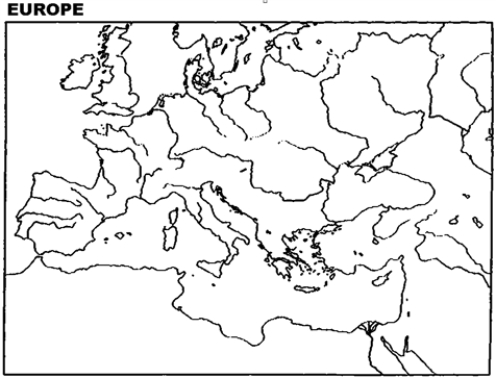Exam 10: Intellectual Transformation: the Scientific Revolution and the Age of Enlightenment
Exam 1: The Ancient Near East: the First Civilizations82 Questions
Exam 2: The Hebrews: a New View of God and the Individual74 Questions
Exam 3: The Greeks: From Myth to Reason95 Questions
Exam 4: Rome: From City-State to World Empire93 Questions
Exam 5: Early Christianity: a World Religion79 Questions
Exam 6: The Rise of Europe: Fusion of Classical, Christian, and Germanic Traditions89 Questions
Exam 7: The Flowering and Dissolution of Medieval Civilization84 Questions
Exam 8: Transition to the Modern Age: Renaissance and Reformation92 Questions
Exam 9: Political and Economic Transformation: National States, Overseas Expansion, Commercial Revolution84 Questions
Exam 10: Intellectual Transformation: the Scientific Revolution and the Age of Enlightenment86 Questions
Exam 11: The Era of the French Revolution: Affirmation of Liberty and Equality92 Questions
Exam 12: The Industrial Revolution: the Transformation of Society79 Questions
Exam 13: Thought and Culture in the Early Nineteenth Century82 Questions
Exam 14: Surge of Liberalism and Nationalism: Revolution, Counterrevolution, and Unification78 Questions
Exam 15: Thought and Culture in the Mid-Nineteenth Century: Realism, Positivism, Darwinism, and Social Criticism86 Questions
Exam 16: Europe in the Late Nineteenth Century: Modernization, Nationalism, Imperialism93 Questions
Exam 17: Modern Consciousness: New Views of Nature, Human Nature, and the Arts78 Questions
Exam 18: World War I: the West in Despair83 Questions
Exam 19: An Era of Totalitarianism87 Questions
Exam 20: World War 2: Western Civilization in the Balance55 Questions
Exam 21: Europe After World War 2: Recovery and Realignment, 1945-198963 Questions
Exam 22: The Troubled Present55 Questions
Select questions type
That "Man is born free; and everywhere he is in chains" was the stirring pronouncement of
(Multiple Choice)
4.8/5  (31)
(31)
Enlightenment philosophes generally approved of Thomas Hobbes's
(Multiple Choice)
4.8/5  (49)
(49)
Please define the following key terms. Show Who? What? Where? When? Why Important?
-Cesare Beccaria
(Essay)
4.9/5  (29)
(29)
Which of the following refused to publish his work due to his concern that it would spark controversy?
(Multiple Choice)
4.9/5  (33)
(33)
Please define the following key terms. Show Who? What? Where? When? Why Important?
-experimental physics
(Short Answer)
4.9/5  (36)
(36)
Please use this outline map of Europe to answer the question(s).
 -Discuss why capitalists could find a champion in Adam Smith. Would Adam Smith have wanted to be such a champion? Can some issues that interested Adam Smith have a relationship to contemporary ones?
-Discuss why capitalists could find a champion in Adam Smith. Would Adam Smith have wanted to be such a champion? Can some issues that interested Adam Smith have a relationship to contemporary ones?
(Essay)
4.8/5  (40)
(40)
Please define the following key terms. Show Who? What? Where? When? Why Important?
-salons
(Short Answer)
4.8/5  (35)
(35)
Please define the following key terms. Show Who? What? Where? When? Why Important?
-the Congregation of the Index
(Essay)
4.9/5  (36)
(36)
Please define the following key terms. Show Who? What? Where? When? Why Important?
-Discourse on Method
(Essay)
4.8/5  (29)
(29)
Please define the following key terms. Show Who? What? Where? When? Why Important?
-Adam Smith
(Short Answer)
4.8/5  (39)
(39)
Why did many Philosophes reject democracy and prefer an enlighted despot?
(Short Answer)
4.8/5  (35)
(35)
The new model put forth by Copernicus and Galileo that believed that the planets orbited the sun was known as
(Multiple Choice)
4.8/5  (31)
(31)
Please use this outline map of Europe to answer the question(s).
 -How did the philosophes view the place and role of women in society?
-How did the philosophes view the place and role of women in society?
(Essay)
4.9/5  (34)
(34)
____ searched for an absolute truth that could serve as the first principle of knowledge.
(Multiple Choice)
5.0/5  (34)
(34)
Please use this outline map of Europe to answer the question(s).
 -Show the widespread nature of the Scientific Revolution by locating on a map of Europe some areas where significant achievements occurred. List the place and the achievement.
-Show the widespread nature of the Scientific Revolution by locating on a map of Europe some areas where significant achievements occurred. List the place and the achievement.
(Essay)
5.0/5  (43)
(43)
Medieval thinkers constructed a coherent picture of the universe that blended the theories of which of the following ancient Greeks?
(Multiple Choice)
4.8/5  (34)
(34)
Please use this outline map of Europe to answer the question(s).
 -In what ways was the Enlightenment a threat to the old regimes in Europe?
-In what ways was the Enlightenment a threat to the old regimes in Europe?
(Essay)
4.9/5  (38)
(38)
Who wrote that people are "born neither good nor wicked; education, example, the government into which he is thrown....determines him to virtue or vice."?
(Multiple Choice)
4.8/5  (41)
(41)
Of the following, who expressed the most interest in using science to advance trade, industry, and the condition in which human beings live?
(Multiple Choice)
4.9/5  (38)
(38)
Showing 61 - 80 of 86
Filters
- Essay(0)
- Multiple Choice(0)
- Short Answer(0)
- True False(0)
- Matching(0)